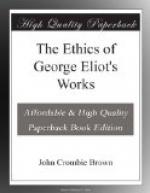Even evangelicism indirectly, in great degree unconsciously, bears witness to the truth through its demand of absolute self-abnegation before God: though the inversion of the very idea of Him fundamentally involved in its scheme makes the self-abnegation no longer that of the son, but of the slave; includes in it the denial of that law which Himself has written on our hearts; and would substitute our subjection to an arbitrary despotism for our being “made partakers of His holiness.” One of the sternest and most consistent of Calvinistic theologians, Jonathan Edwards, in one of his works expresses his willingness to be damned for the glory of God, and to rejoice in his own damnation: with a strange, almost incredible, obliquity of moral and spiritual insight failing to perceive that in thus losing himself in the infinite of holy Love lies the very essence of human blessedness, that this and this alone is in very truth his “eternal life.”
Among what may be called Essayists, two by general consent stand out as most deeply penetrating and informing the spirit of the age—Carlyle and Ruskin. To the former, brief reference has already been made. In the work then quoted from, one truth has prominence above all others: that with the will’s acceptance of happiness as the aim of life begins the true degradation of humanity; and that then alone true life dawns upon man when truth and right begin to stand out as the first objects of his regard. Never since has Carlyle’s strong rough grasp relaxed its hold of this truth; and howsoever in later works, in what are intended as biographical illustrations of it, he may seem to confuse mere strength and energy with righteousness of will, and thence to confound outward and visible success with vital achievement, that strength and energy are always in his eyes, fighting or enduring against some phase of the many-headed hydra of wrong.
Of Ruskin it seems almost superfluous to speak. They have read him to little purpose who have not felt that all his essays and criticisms in art, all his expositions in social and political science, are essentially unified by one animating and pervading truth: the truth that to man’s moral relations, or, in other words, the developing and perfecting in him of that Divine image in which he is made,—all things else, joy, beauty, life itself, are of account only to the degree in which they are consciously used to subserve that higher life. His ultimate standard of value to which everything, alike in art and in social and political relations, is referred, is—not success, not enjoyment, whether sensuous, sentimental, or aesthetic, but—the measure in which may thereby be trained up that higher life of humanity. Art is to him God’s minister, not when she is simply true to nature, but solely when true to nature in such forms and phases as shall tend to bring man nearer to moral truth, beauty, and purity. The Ios and Ariadnes of the debased Italian schools, the boors of Teniers, the Madonnas of Guido, are truer to one phase of nature than are Fra Angelico’s angels, or Tintoret’s Crucifixion. But that nature is humanity as degraded by sense; and therefore the measure of their truthfulness is for him also the measure of their debasement.




